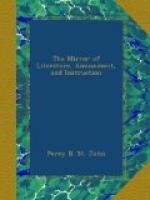[5] There is a cookery-book,
by “a Lady,” and a cookery-book by a
Physician;
but Mrs. Rundell and Dr. Kitchiner will soon be warned
off
the gridiron by the erudite genuine practical cook,
who has
a
right to the kitchen stuff of literature.
Mrs. R. must show
herself
to be what she professes, and take “her chops
out of the
frying-pan;”
and the “good doctor” must “put his
tongue into plenty
of
cold water” to cool its boiling, broiling ardour.
* * * * *
STEAM.
A Mr. Josph Hardaker has sung the praises of this gigantic power in thirty-five stanzas, entitled “the Aeropteron; or, Steam Carriage.” If his lines run not as glibly as a Liverpool prize engine, they will afford twenty minutes pleasant reading, and are an illustration of the high and low pressure precocity of the march of mechanism.
* * * * *
TIME’S TELESCOPE FOR 1831
Has appeared in somewhat better style than its predecessors. The paper is of better quality, the print is in better taste, and there are a few delicate copper-plate engravings. The old plan or chronological arrangement is, however, nearly worn threadbare, and to supply this defect there are in the present volume many specimens of contemporary literature. Few of them, however, are first-rate. The most original portion consists of the Astronomical Occurrences, which extend to 150 pages.
* * * * *
POPULAR CHEMISTRY.
Such is the title of the fifth part or portion of Knowledge for the People: or, the Plain Why and Because: containing Attraction or Affinity—Crystallization—Heat—Electricity—Light and Flame—Combustion—Charcoal—Gunpowder and Volcanic Fire. We quote a few articles from most of the heads:—
Why is the science of chemistry so named?
Because of its origin from the Arabic, in which language it signifies “the knowledge of the composition of bodies.”
The following definitions of chemistry have been given by some of our best writers:—
“Chemistry is the study of the effects of heat and mixture, with the view of discovering their general and subordinate laws, and of improving the useful arts.”—Dr. Black.
“Chemistry is that science which examines the constituent parts of bodies, with reference to their nature, proportions, and method of combination.”—Bergman.
“Chemistry is that science which treats of those events or changes, in natural bodies, which are not accompanied by sensible motions.”—Dr. Thompson.
“Chemistry is a science by which we become acquainted with the intimate and reciprocal action of all the bodies in nature upon each other.”—Fourcroy.




